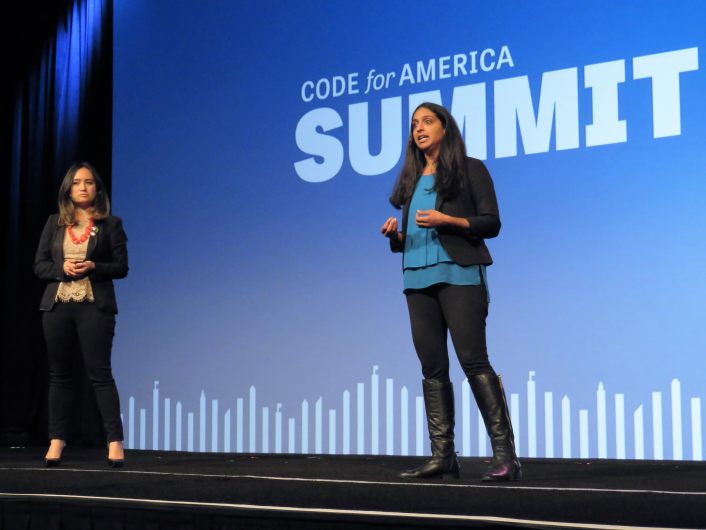

This year’s Code for America Summit attracted thousands of tech experts and government policy wonks from across the country to Oakland. Their purpose is to move the bureaucratic systems of government into the digital age and make them as responsive as the consumer apps used on mobile devices daily.
There was another overriding theme: inclusion and the promotion of diversity. The summit, meeting for the second year in Oakland, has even been characterized as being radically inclusive, making it a perfect fit for the city.
“Starting with users isn’t just how we should be making technology. It’s how we should be making government,” said Jennifer Pahlka, founder of Code for America (CfA).
The three-day summit was held earlier this month at the Oakland Marriott City Center. Many of the presentations addressed social issues such as policing and community trust, criminal justice, education and broadband access.
Microsoft was a major sponsor of the summit and called for greater diversity and inclusiveness in tech hiring, including minorities and people with a broad range of disabilities. The company has started a program to support individuals on the autism spectrum. and it presented a video highlighting the valuable contributions of workers with autism.
“In the case for autism, we know there is an untapped pool of talent with skills aligned to the work we are doing every day at Microsoft,” states the Microsoft disAbility web page.
Jenny Lay-Flurrie, Microsoft’s chief engagement officer, said the company learned to provide extra coaching on norms and support services and developed a more inclusive interview format.
“That provided the foundation for a new way of working in a more inclusive environment for all,” she said. “All we had to do was change the way we interviewed.”
“Equity is critical to Oakland,” said Kiran Jain, chief resiliency officer for the City of Oakland, adding that the city is focused on community engagement strategies such as human-centered design approaches to city services. She said they made connections with other cities doing similar work, including New York City and San Francisco. They also connected with the UK’s Government Digital Services team.
“Now government has an opportunity to build tech for everyone to use,” said Mai-ling Garcia, Oakland’s online engagement manager. “But government must work with the public at their current tech level, even with old boxy computers and older phones.”
She used Oakland’s digital front door project, a collaboration with CfA to update the city’s web site, as an example. She said it encouraged greater staff interaction with the public. The prototype is at beta.oaklandca.gov.
Presenters included CfA Fellows and leaders in state and local government and also leaders of the CfA “brigades.” The brigades partner with local city governments to open access to city data and build new applications for new or outdated government services. The brigade model has been so successful that it is being replicated globally with groups like Code for Germany and Code for Pakistan.
The leading geeks in the U.S. government’s 18F digital services agency announced a new repository of Open Source Software for state and local governments, http://Code.gov, that went live during the summit. The site highlights consumer-friendly projects such as “Owning-a-home”, tools and resources for home buyers, and “College-costs”, a tool to help students weigh the costs and rewards of college.
“I come to these summits to find out what’s new and find synergy with developers on how to get government unstuck from its bureaucratic ways of doing things.” said Steve Malone, a volunteer from Code for San Francisco. “Government entities understand their user base better, and technologists with more agile mindset are better able to streamline old processes.”
Neil Plancon, a member of the leadership team of the OpenOakland brigade, agreed.
“The summit was a very inspiring way to remind us what is important about the civic tech movement and the brigades’ projects to improve government, making more possible with for the thousands who need it most,” he said. He was recently elected to the CfA Brigade National Advisory Council.
The OpenOakland brigade received several awards at the CfA Summit, including one for the Open Disclosure project, which partnered with the Oakland Public Ethics Commission and provided detailed campaign finance information via a web site and mobile app.
OpenOakland also got awards for holding more than 200 hack nights at Oakland City Hall and organizing annual City Camp and National Day of Civic Hacking events, both of which will happen again in 2017.
For more information about Microsoft’s inclusionary hiring program, visit https://www.microsoft.com/en-us/diversity/inside-microsoft/cross-disability/hiring.aspx
Howard Dyckoff has lived in Oakland for over 40 years and has been involved with many community groups, including Oakland Digital and Oakland Local, Block by Block, the East Oakland Boxing Association (EOBA), and CBE. A Brooklyn, New York, transplant, and an Aerospace Engineering graduate of NY Polytechnic, Howard also attended Laney College, where he wrote for the Laney Tower newspaper and was elected editor. Howard also attended the Starr King School at the Theological Union in Berkeley.
He has served as the Berkeley Free Clinic’s Outreach Coordinator, and also worked as an information technology professional at Chevron, Sybase, and Wells Fargo. He worked in both the 2010 and 2020 Census. Howard has been a regular contributor to Oakland Local and online publications such as TechTarget and Linux Gazette and currently writes for Oakland Voices. He currently does event photography and portraiture around the Bay Area.

Be the first to comment